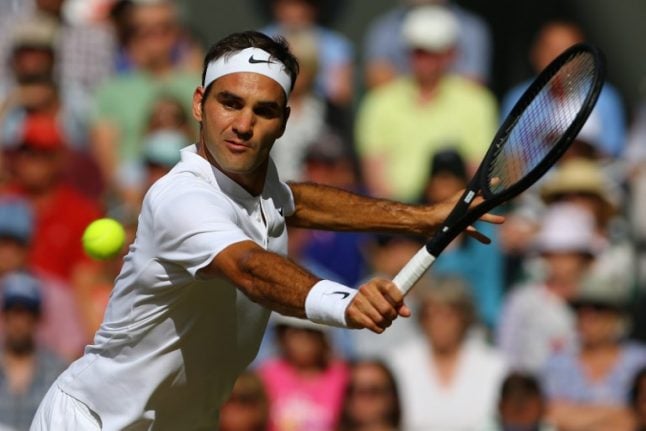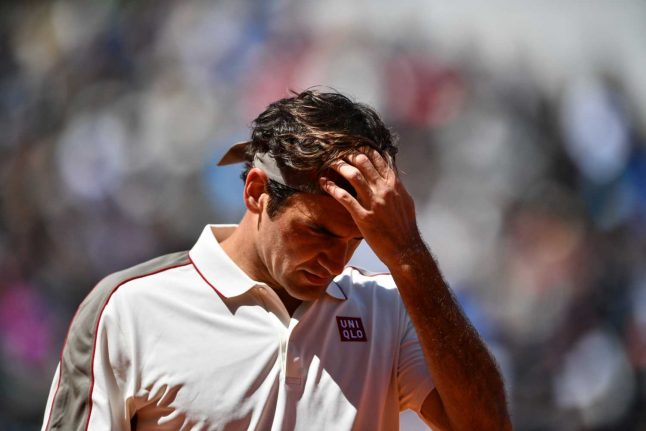TENNIS
Roger Federer, from Mr Angry to Mr Perfect
From racquet-smashing enfant terrible with a bad attitude and ill-advised ponytail to universally respected sporting role model and modern icon, Roger Federer has come a long, long way.
Published: 15 July 2017 14:42 CEST

Roger Federer is on the verge of making history. Photo: GARETH FULLER / AFP
Fourteen years after winning his first Grand Slam title at Wimbledon, Federer stands on the verge of an historic eighth All England Club triumph and 19th major.
Victory over Marin Cilic on Sunday would also make the 35-year-old the oldest man to triumph on the famed grass courts tucked away in the plush suburbs of south-west London.
“2003 feels like ages ago, because of the ponytail, the beard, whatever, you name it. This one is different,” said the Swiss star after downing Tomas Berdych to reach his 11th Wimbledon final.
Many other things have changed for Federer since that Centre Court triumph over Mark Philippoussis in 2003.
On court, his successes have brought him more than $100 million in prize money and 92 career titles. Off it, he is the father of two sets of twins, Myla Rose and Charlene Riva and Leo and Lenny with wife Mirka, a former player he met at the 2000 Olympics in Sydney. But his career and life wasn't always so settled.
As a talented young player, Federer's on-court tantrums and hair-trigger temper once threatened to stunt his progress.
“I had a tough time getting my act together out on court, trying to behave properly. For me that was a big deal,” he admitted.
Federer famously defeated Pete Sampras at Wimbledon in 2001 but was knocked out in the first round the following year.
It took a personal tragedy for Federer to press the reset the button. Just when he turned 21, his coach and close friend from his formative years Peter Carter was killed in a car crash in South Africa. From that point on, the multi-lingual Federer committed himself to winning in style, with grace and not dictated to by his inner demons.
Great rivals
Born on August 8, 1981 in Basel, to Swiss father Robert and South African mother Lynette, Federer started playing tennis at eight.
He won his first ATP title in Milan in 2001 and has racked up trophies every year since with the exception of 2016 when he shut down his season after a semi-final loss at Wimbledon.
That extended rest, to recover from a knee injury, led to his 2017 renaissance with a refreshed Federer winning his 18th major at the Australian Open.
It was after the first of his five Australian Opens in 2004 that he claimed the world number one ranking for the first time. In his career, he has been at the top of the pile for 302 weeks.
Federer also has seven Wimbledons — a mark he shares with Sampras — five US Opens and a single French Open.
He has won 26 Masters, a 2008 Olympic doubles gold medal with close friend Stan Wawrinka and a Davis Cup victory for Switzerland in 2014.
Had he not competed in the same era as Rafael Nadal and Novak Djokovic, his trophy collection could have been more impressive — he has lost nine finals at the majors to his two great rivals.
His stunning longevity has seen him play 101 matches at Wimbledon, 100 in Melbourne, 89 at the US Open and 81 at Roland Garros.
Despite those impressive numbers, Federer admits he still battles serious nerves before a big tennis occasion.
“Sometimes it slows down your legs, your pulse starts racing…that can stress you out a tad,” he says. “I always say I'm happy I feel that way because it means I care. It's not like going through the motions like careless. That would be a horrible feeling, to be honest.”
Win or lose on Sunday, Federer says he has not set any date for retiring from the sport.
“It's just discussions I always have with my wife about the family, about my kids, is everybody happy on tour, are we happy to pack up and go on tour for five, six, seven weeks. Are we willing to do that?,” he said. “For the time being, it seems like absolutely no problem, which is wonderful.”
Federer has reached his 11th Wimbledon final without dropping a set.
Berdych sees no indication that Federer is showing any sign of the advancing years.
“If you look at the other guys who are 35, 36, I think you can very clearly see that age and the years on tour are affecting them,” said the Czech. “But not him.”
Url copied to clipboard!


 Please whitelist us to continue reading.
Please whitelist us to continue reading.